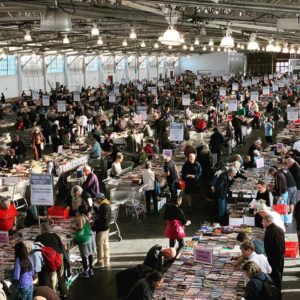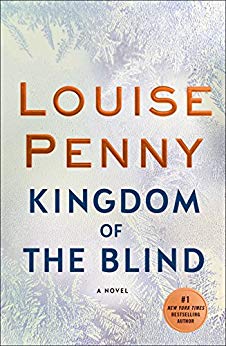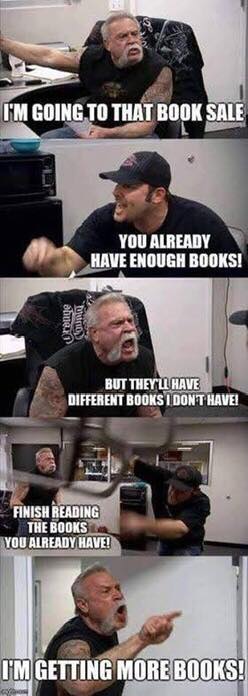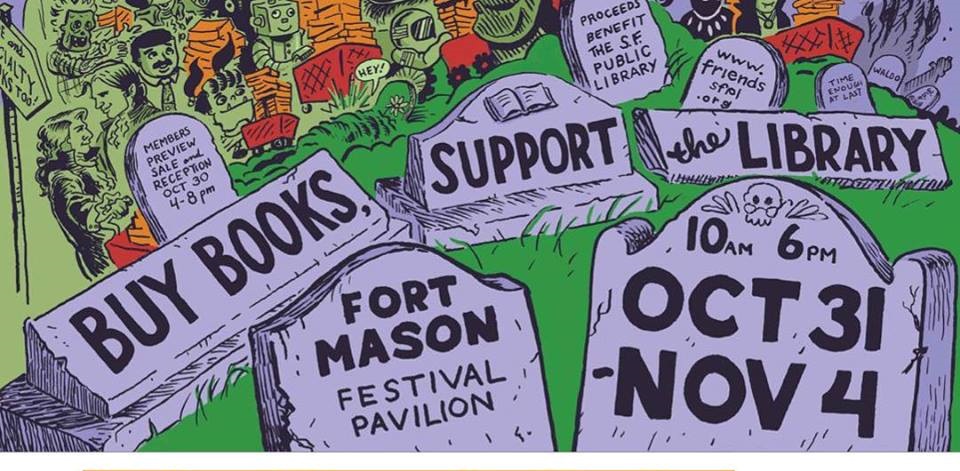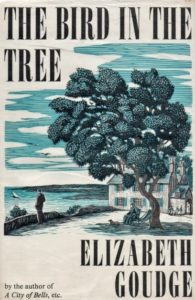Big Book Sale Update
Back for a moment to tell you about the Friends of the San Francisco Library Big Book Sale. It was the largest and most successful ever. The sale set a new record and made over $300,000! And all of it goes to support the San Francisco Public Library and its programs.
Some photos to show the enormity of the event. And if you’re more of a math person: $300,000 with nothing priced more than $4. That’s a lot of books, records, and CD’s.
In case you were wondering –it wasn’t all me. I bought merely five books.
Full Stop
Stop watching television.
Stop everything.
Look what arrived in my mailbox today!
An advanced readers copy of Louise Penny’s latest mystery
Many (many) thanks to Minotaur/St. Martins press.
Kingdom of the Blind will be published on November 27th.
Once again, Book Barmy advice — circle November 27th on your calendar, set those reminders on your phones, drop everything and get thee to your local independent bookstore — and purchase your own copy.
Meanwhile, I’m all prepped:
Hot tea in thermos — check
Comfy clothes on — check
Cancelled anything not urgent — check
Stretching videos for reading breaks* — check
Folder of restaurant delivery menus — check
Bye for now. See ya.
I’m not available for anything or anyone for a few days.
* This PBS stretching series is a new discovery. Husband and I have 40 or so saved on our DVR and while they seem deceptively simple, they are wonderful for posture (mine is terrible) and joint pain. Miranda is 60+, a former ballet dancer, and her movements/stretches really have improved my posture, muscle tone, and flexibility. Husband no longer has to wear an ankle brace to play tennis. Check your local PBS station (they’re on @ 7:30 AM out here). Highly recommended. Don’t feel bad if you can’t make it all the way through the first time – takes some build-up.
Required Reading
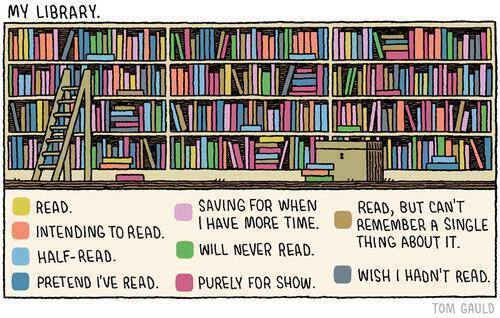 After my last post, a Book Barmy follower sent me the following essay from the NY Times Book Review. A must read for any book lover and those who love them (talking to you Husband). At the very least, scroll down to the last paragraph – my favorite bit.
After my last post, a Book Barmy follower sent me the following essay from the NY Times Book Review. A must read for any book lover and those who love them (talking to you Husband). At the very least, scroll down to the last paragraph – my favorite bit.
All Those Books You’ve Bought but Haven’t Read? There’s a Word for That
By Kevin Mims
I own far more books than I could possibly read over the course of my remaining life, yet every month I add a few dozen more to my shelves. For years I felt guilty about this situation, until I read an article by Jessica Stillman on the website of the magazine Inc. titled “Why You Should Surround Yourself With More Books Than You’ll Ever Have Time to Read.” Stillman argued that a personal library too big to get through in a lifetime “isn’t a sign of failure or ignorance,” but rather “a badge of honor.” Her argument was a variation on a theme put forth by Nassim Nicholas Taleb in his 2007 best seller “The Black Swan,” a book about the outsize impact on our lives of large, unpredictable events. In essence, Taleb claims that although people tend to place a higher value on the things they know than on the things they don’t know, it is the things we don’t know, and therefore can’t see coming, that tend to shape our world most dramatically.
A person’s library is often a symbolic representation of his or her mind. A man who has quit expanding his personal library may have reached the point where he thinks he knows all he needs to and that what he doesn’t know can’t hurt him. He has no desire to keep growing intellectually. The man with an ever-expanding library understands the importance of remaining curious, open to new ideas and voices.
Taleb argues that a personal library “should contain as much of what you do not know as your financial means, mortgage rates and the currently tight real-estate market allow you to put there. You will accumulate more knowledge and more books as you grow older, and the growing number of unread books on the shelves will look at you menacingly. Indeed, the more you know, the larger the rows of unread books. Let us call this collection of unread books an antilibrary.”
I don’t really like Taleb’s term “antilibrary.” A library is a collection of books, many of which remain unread for long periods of time. I don’t see how that differs from an antilibrary. A better term for what he’s talking about might be tsundoku, a Japanese word for a stack of books that you have purchased but not yet read. My personal library is about one-tenth books I have read and nine-tenths tsundoku. I probably own about 3,000 books. But many of those books are anthologies or compilations that contain multiple books within them. I own a lot of Library of America volumes, a series that publishes the complete novels of authors like Dashiell Hammett and Nathanael West as a single book. Thus, my 3,000-book library probably holds more than 6,000 works. Once I have read a book, I often give it away or trade it in at a used-book store. As a result, my tsundoku is ever expanding while the number of books in my house that I have read remains fairly constant at a few hundred.
In truth, however, the tsundoku fails to describe much of my library. I own a lot of story collections, poetry anthologies and books of essays, which I bought knowing I would probably not read every entry. People like Taleb, Stillman and whoever coined the word tsundoku seem to recognize only two categories of book: the read and the unread. But every book lover knows there is a third category that falls somewhere between the other two: the partially read book. Just about every title on a book lover’s reference shelves, for instance, falls into this category. No one reads the American Heritage Dictionary or Roget’s Thesaurus from cover to cover. One of my favorite books is John Sutherland’s “The Stanford Companion to Victorian Fiction.” It’s a fascinating, witty and very opinionated survey of Victorian England’s novels and novelists, from the famous (Dickens, Trollope, Thackeray) to the justifiably forgotten (Sutherland describes the novels of Tom Gallon as “sub-Dickensian fiction of sentiment and lowlife in London, typically written in an elliptical, rather graceless style”). I’ve owned the book for 20 years and derived great enjoyment from it, but I doubt I’ll ever manage to read every word of it or of dozens of other reference books on my shelves.
Nor do I typically read biographies all the way through. Biographers have a tendency to shoehorn every last tidbit of information they can into their books. I don’t really care about the marks that Ogden Nash received on his third-grade report card or how many trunks of clothing Edith Wharton had shipped across the Atlantic when she moved to France. There are probably hundreds of biographies in my personal library. I have read parts of most of them but I have read very few in their entirety. The same is true of collections of letters. Whenever I finish reading a work of fiction by, say, Willa Cather, I’ll be inspired to pull out the massive tome “The Selected Letters of Willa Cather” and try to get the measure of what the author was like when she was “off duty.”
These cannot be counted as books I have read, but nor can they be labeled tsundoku. Like much of my library, they live in the twilight zone of the partially read. Taleb argues that “read books are far less valuable than unread ones,” because unread ones can teach you things you don’t yet know. I don’t really agree with him. I think it’s a good idea to keep your shelves stocked both with books you’ve read and books you haven’t. But just as important is that third category of book: those you haven’t read all of and may never get around to finishing.
The sight of a book you’ve read can remind you of the many things you’ve already learned. The sight of a book you haven’t read can remind you that there are many things you’ve yet to learn. And the sight of a partially read book can remind you that reading is an activity that you hope never to come to the end of.
Perhaps the Japanese have a word for that.
Kevin Mims lives in Sacramento and works at the Avid Reader bookstore, where he has partially read much of the inventory.
Our Souls at Night by Kent Haruf
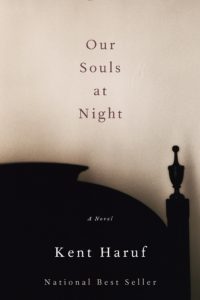 Our Souls at Night is a beautiful, hopeful book – but alas, not everyone’s cup of tea.
Our Souls at Night is a beautiful, hopeful book – but alas, not everyone’s cup of tea.
Set in a small town in Colorado, Louis and Addie are neighbors, both in their 70’s and both widowed. They know each other, chat when they see each other — just neighbors of the same age.
The book opens with Addie visiting Louis and proposing they spend their lonely nights together – sleeping in the same bed, companionship, no sex, also with the hope they will both be able to sleep better.
The characters Louis and Addie unfold naturally through their nightly conversations telling about their lives—the happy and sad moments, their regrets, the unfulfilled dreams. They discuss their late spouses and their children. They talk about life. But most of all, they find comfort in each other’s company. They are achingly human in their loneliness and need for companionship and they ignore what the townspeople have to say about their arrangement.
When Addie’s troubled grandson comes for the summer, their relationship deepens (yes, that’s just what it means) as they give the little boy a special summer filled with softball games, overnight camping, and the responsibility of his first dog.
Many readers are put off by Mr. Haruf’s spare writing style – his lack of quotation marks and sometimes clipped dialogue. But I admire his deceptively simple language which conveys complicated relationships, heartbreak, and humor. Every word is essential. There is nothing extra. Our Souls at Night uses elegant, almost poetic, prose to move the story forward quickly — it can be read in one evening — yet there’s a leisurely sense of time.
The ending is sad and, for me, a bit unsettling as Addie is portrayed as a capable woman who isn’t afraid to make her own choices, yet she conceded to her controlling son, and gave up a relationship that was bringing joy to her life. But then again, Our Souls at Night is all about humans, their frailties, and the way life really is.
All Mr. Haruf’s books are worth reading and re-reading on so many levels, for their simplicity and accessibility — but especially their literary qualities, an unfortunately rare combination. You know you have read “literature” when you have read Haruf, but the experience is effortless.
Netflix made a film based on this novel starring Jane Fonda and Robert Redford, and after you’ve read the book it’s well worth watching — these two actors do a wonderful job of capturing the characters and their relationship.
Trailer HERE
Sadly, this was Mr. Haruf’s last book as he passed away in 2014.
The Bird in the Tree by Elizabeth Goudge
“Pick up an Elizabeth Goudge novel and from the first page you will feel your shoulders drop.”
The above quote comes from from Cornflower Books, one of my favorite book blogs. Cornflower hails from somewhere in Northern England and her two blogs are filled with the joy of books such as this, but also gardening, knitting, cooking and art — a kindred spirit. Click above or on the blog list to the left to see for yourself.
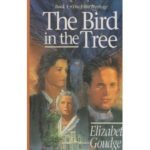 Based on Cornflower’s review and in a desperate mood for an old-fashioned read, I got The Bird in the Tree –with this dreadful cover — from the library. (I much prefer the vintage cover above).
Based on Cornflower’s review and in a desperate mood for an old-fashioned read, I got The Bird in the Tree –with this dreadful cover — from the library. (I much prefer the vintage cover above).
Elizabeth Goudge is a British writer, probably best known for her novel Green Dolphin Street (nope, haven’t read it). The Bird in the Tree is set in 1938 and is the first in a trilogy about the Eliot family and their beloved home, Damerosehay on the Hampshire coast.
Nothing better than a British house setting I thought as I opened the book, trying not to form images of the characters from the tacky 1980’s cover.
The first thing to strike this reader is that Ms. Goudge is verbose. She obviously loved nature and takes pages to describe the beauty in her settings — from the gardens, to the sunsets, grand water views, and even the individual birds.
Soon, however, as the quote above predicted, my shoulders lowered and I relaxed into the slow rhythm and realized I was enjoying some very nice writing.
Early in the novel there’s a flashback to when Lucilla and her young grandson first discover the house that would become Damerosehay. The descriptions (there’s pages of them) of the abandoned home and its gardens makes for some enchanting reading. Here’s just a taste:
…for it was such a garden as neither of them had seen before. It was a wild, crazy garden, the kind of garden in which the sleeping beauty and her court lays sleeping for a hundred years. Once it had been planted with orderly care and neatness, but now all the flowers and trees and bushes had gone mad together with a sort of jubilant madness that was one of the loveliest things Lucilla had ever seem. The rose trees, bright with their new green leaves, were running riot everywhere, climbing up over the old wall, festooning themselves over the cherry trees and oak trees, cherry trees to the east and oaks to the west that grew in the tangle of wild grass that had once been lawns and flowerbeds …
Lucilla,with the help of her children, purchase the house and it is transformed into the warm and beautiful place she wants as a safe haven for her children, their children and generations beyond.
Lucilla and her family are far from perfect. The characters are revealed through both their actions and innermost thoughts and thus, we discover the Eliots share heartbreak and wounds — not to mention the art of manipulation and resentment — all bubbling just beneath the surface. There’s an ill-advised love affair that threatens the Eliot family relations. Some past secrets are revealed and others stay – well secret. But mostly this is a novel about people and a home they love.
Lucilla’s son Hilary (don’t you just love British names) although the least clever of the Elliot family, turns out to be the happiest, in his role as village vicar:
…Fairhaven liked to hear the [church] bell tolling out every morning, sounding through the winter darkness as though to tell them that the night was over or ringing through the spring and summer birdsong like another bird calling in the sky. The ungodly, rousing from sleep, set their watches by this bell, and the godly whilst also setting their watches, remembered that, at this hour Hilary was praying for them. They were glad of that, for they liked Hilary.
Hilary as expected does give deliver advice and counsel, but it’s nothing compared to the morale high ground voiced by Lucilla and her long time ladies maid, Ellen (yes, there’s a lady’s maid). I shook my head in amusement and dismay at their self assurance when weighing in on other people lives.
But in the end, the Eliots love each other and while they suffer from an excess of contemplation, they are good people who do the right thing – and yes, there’s a neatly-tied-up-fairly-happy ending.
Old fashioned, overly sentimental and, at times, melodramatic — The Bird in the Tree was just what the doctor, or in this case, Cornflower Books recommended – I felt better having read it.
The second in this series – Pilgrim’s Inn is on my list for the next time I’m in need of a restorative read.



